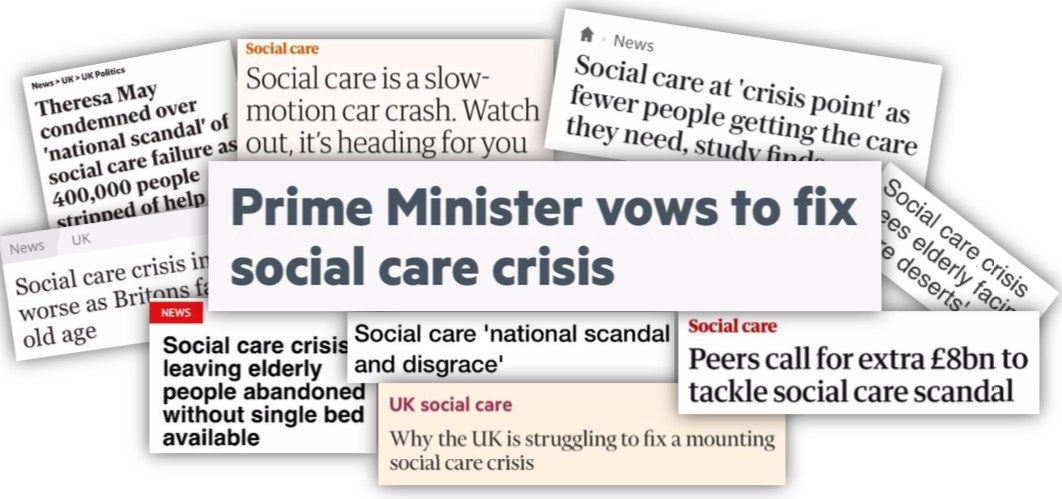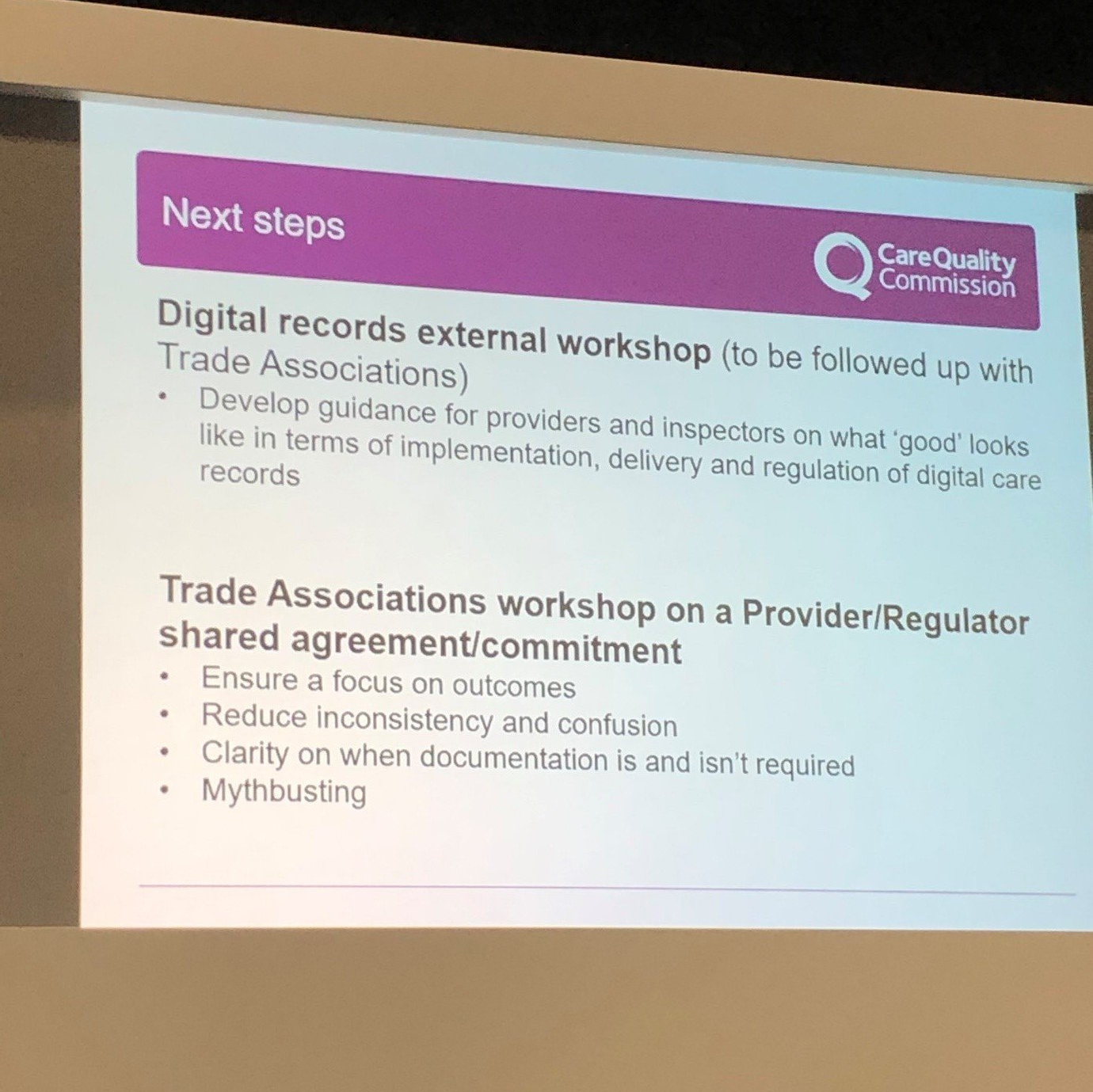The Care Show Birmingham
Sophie Chester-Glyn • Oct 11, 2019
Yesterday, we were lucky enough to attend the Care Show
in Birmingham, an annual two-day health and social care conference held to showcase new initiatives, technologies and products for the sector. Key to the conference is its talks and debates from care industry leaders. Whilst we were only able to attend part of the event, in the interest of opening up the care debate, we are blogging about what we learnt. Please feel free to #share.
One talk which care providers may find particularly interesting is that from David James at Care Quality Commission (CQC). Having worked for the CQC for 13 years, David was well qualified to inform us on CQC’s current approach to technology in homecare services during his talk at the UKHCA Theatre.
Benefits of technology
David explained that CQC was committed to recognise the benefits of technology. The feedback from inspectors included that technology can:
- Promote independence
- Enhance care
- Be an important communication tool and
- Support information sharing with others
- Support person-centred practices
Essentially, if used well, technology can be a key indicator of innovation by providers. Their definition of innovation is:
David cautioned that whilst technology is, in essence, positive, the interests of the people being supported
must be key to the choice, introduction and use of technology. People must be at the heart not just the receiving end of organisation’s use of the technological.
There are however, challenges in using technology. There must be continuous learning within organisations and technology is not a panacea - its benefits should be assessed against the characteristics of the CQC ratings.
His final message was that technology is great, but ultimately it must be linked to the quality of care technology for its own sake.
Next steps for CQC in this area:
Andy Begley, Director of Adult Services & Housing, Shropshire Council
Andy Begley
gave an enlightening talk about how technology in care is helping to keep people safe. He discussed considering collecting data on who is living alone, not going out and not accessing services and comparing this with data on how likely they might be to need services. This would then inform the local authority’s decision to support people before they require support services. It was refreshing to hear a director of adult services question the way in which commissioning currently works and to persist with better use of data and better working between local authorities to make services more responsive. Read more about his work in a recent article.
Andy’s work on using data to predict when vulnerable older people might need support in their home and to intervene in people’s lives before a crisis occurs seems a perfect fit to Matt Hancock’s prevention vision. He revealed that there is a huge amount of data which can be collected from people’s lives, such as who is not paying council tax and how this can be used to consider uncovering hidden support needs. Councils might want to consider analysing the data rather than sending out warning letters? Could it have resulted from mental health issues or money management support needs?
Fundamentally, however, collecting more data on people’s lives and sharing this data amongst local authority departments and between local authorities themselves might seem like a good idea, but the issues of GDPR
were discussed as a fundamental problem, not least because of people’s misunderstanding of what GDPR means for organisations.
Karolina Gerlish, CEO of NACAS (national association of care and support workers)
“ We have to improve the image of careers in health and social care. Until people are faced with it, they don’t know what social care is”
One of the most anticipated talks was from the enthusiastic Karolina Gerlish from NACAS. Karolina made a clear link between her message and the fact that she was speaking on National Mental Health Awareness
day. However, she was not speaking about mental health from the perspective of the mental health patient but from the perspective of care workers. She focused on research carried out by NACAS with care workers.
NACAS has found that:
- 80% of the 600 care workers questioned said that they had suffered from burnout.
- Only 48% of people felt that they could pay for their basic needs expenses from the wage they received, signifying that there is an issue with economic well-being as well as mental well-being when working in care.
- Most also felt that their pay did not allow them to pay for a holiday.
Karolina reminded us that, each September, NACAS support ‘national care workers day’ – an event they started. The aim was for organisations to do something special for their care workers and for everyone to recognise what care workers do.
They are also campaigning heavily for the recognition of care work as a profession.
One of the impressive points from Karolina, however, was that those working in care long term should be recognised as experts, not people lacking ambition. NACAS has also suggested recommendations to improve care work for care workers, including:
- appropriately funding providers so that this can trickle down to care workers
- to have social care funded at least on a par with health care
- Karolina pointed out that Mental Health First Aid training should be shared not only to people in relation to those being supported, but also for staff to spot mental well-being being a priority for their colleagues.
Her final and arguably most poignant point was that providers (and arguably commissioners) need to show appreciation for care workers. Giving positive feedback such as the small messages of thanks, cards of appreciation and recognition, can help towards mental well-being and turnover rates.
Check out their full report here.
Digital Social Care
For those new to the Digital Social Care platform, Claire Sutton (Digital Transformation Lead at the National Care Forum) gave us a comprehensive introduction. Launched earlier this summer, Digital Social Care
is made up of a group of social care organisations who realised that support for the social care sector to embrace, fund and understand technology is lacking. So, made up of Care England, National Care Association, National Care Forum, Registered Nursing Association, Skills for Care, UKHCA
and the Voluntary Organisation Disability
Group (VODG), Digital Social Care is set to reform social care’s confidence and competence around technology through its online informative platform.
Some key messages included:
- Digital social care want to hear about technology case studies, but from a care provider perspective. The aim is to support providers to learn from each other.
- GDPR causes a stress to many, but shouldn’t. Her message on GDPR was that it’s about applying the rules we already have around technology to the specific rules within GDPR. Effectively, we’re already doing good stuff around technological safety, we just need to evidence and practice it more effectively.
- The Digital Social Care website has guidance on how to complete their ‘data security protection toolkit’. One of the key benefits when providers complete the toolkit is that they receive an NHS secure email which, amongst other benefits, allows providers to contact professionals within the NHS securely.
- There is a ‘special interest group’ with about 100 providers who they consult with on the projects they are promoting. If you feel you should be in that group, then email them.
- One great resource is information on funding opportunities to either adopt, promote or understand technology in care. Check out new opportunities here for medium sized companies and here for small care company funding opportunities #bookmark!
Our short and very partial visit revealed some fantastic insights into the ever-developing area of health and social care. For a complete list of the contributors we missed, check out the Care Show’s agenda on their website.
Maybe see you there next year? Maybe not. Either way, passes are free, travel is discounted and if we are there, we’ll let you know what happened!
#staytuned #share #CoproduceCare #blogs #democratise the #caredebate
Join us
We will be relying on a small but dedicated team and volunteers.
So, if you would like to be involved, please get in touch at hi@coproducecare.com
and help us open up the care debate, properly democratise care and please do join and share Coproduce Care:
Spread the word and uncover the hidden opportunities for people-led coproduced care
Recent Posts

24 Aug, 2023
We are pleased to provide an update our involvement in new projects currently being undertaken by Coproduce Care (CIC) in collaboration with Care and Support West. We will be contributing to local initiatives in Social Care Workforce Redesign, and we are excited to share the project with you. This project is running from June 2023 to June 2024. We will be working on three areas for the next 10 months all in the BNSSG region which are as follows: 1: Investigation of the Trusted Assessor Approach in Health and Social Care Systems In this project, we are investigating the Trusted Assessor Approach in health and social care systems. The objective is to demonstrate the value of Trusted Assessors in streamlining care needs assessment, while also addressing data protection and consent concerns. Case studies will be created from local regions that have implemented this approach, to provide insights into the benefits of Trusted Assessors of reducing delays in accessing required care. 2: BNSSG Opportunities for Levy Sharing and Increasing Apprenticeships in Social Care This project aims to identify opportunities for levy sharing in social care and increase the use of apprenticeships. The project will engage social care providers, training organizations, authorities, and other stakeholders to develop strategies, guidelines, and an implementation plan for utilizing the levy effectively and increasing the use of apprenticeships. 3: Integrated Health and Social Care: Enhancing Collaboration, Improving Quality, Shaping Models of Care, and the Future Social Care Workforce In this project, we are evidencing the enhanced collaboration between social care providers, health services, and local authorities. By mapping existing interfaces and collaborations, we seek to identify opportunities for cross-system benefits and improved outcomes, creating recommendations for integration for BNSSG. Our research will provide valuable insights to integration and collaboration between social care and health. At Coproduce Care (CIC), we believe that collaboration and innovation are vital for transforming social care. Through these projects, we aim to contribute to a more efficient and compassionate system. We extend our gratitude to all stakeholders, providers, commissioners, and policymakers for their invaluable support. Thank you for your continued interest in our endeavours. We will keep you updated as the projects progresses! In the meantime, if you are doing any work in any of these key areas, please get in touch with us using the below form. Thank you!

18 Oct, 2022
Dear Thérèse Coffey, We wish you the best of luck on your appointment as Secretary of State for Health and Social Care. Coproduce Care (CIC) is a non-profit organisation set up to democratise the social care debate. We support the voices of those working and involved in social care to influence wider decision making in the sector. Through our continued work in this area, we are writing to address some of the urgent needs of our social care workforce. We welcome your plans to set out ‘ Our plans for patients ’ to ensure our population have easier access to NHS and social care services through winter, putting the needs of patients as priority. To ensure we prioritise the health and wellbeing of our populations, and deliver the best, high-quality care possible, we need to ensure we prioritise the needs of our workforce who are at the front of delivering health and social care . To ensure both the health and wellbeing of our population and our social care workforce, we recommend the following: 1. Improving pay for social care workers, in real terms The Kings Fund published a report which compared the pay of social care workers to ten of the largest supermarkets. It found that nine out of ten supermarkets paid more than most social care roles. An example used is that if care worker left their role for a supermarket position at Tesco, they would see a 6.3% pay increase instantly. We have conducted many surveys, webinars, and connected with our audience on what is crucial to improving care workers working conditions and we have found that increasing pay is consistently the most crucial factor in reflecting the value of the work and high stress and responsibilities of the role . With the current cost of living crisis, this need for increasing pay is only getting more urgent. The sector currently has 100,000 vacancies , with extremely high levels of staff shortages. This affects the capacity to deliver services and the quality of care provided . Providers are struggling to recruit staff as they are competing with supermarkets and hospitality, sectors of which offer less stress and responsibility and more pay. We believe care workers are an invaluable part of our society and therefore should be paid accordingly. We recommend: · Introduce national pay scales that ensure care workers meet a real national living wage as a minimum . This will recognise the full contribution of social care workers make to the health of our population, and that their contribution is a real investment into our population. By increasing pay, we further increase recruitment and retention in the sector, and improve the perception of social care being a highly valuable and promising career choice. · Facilitate efforts to develop appropriate distribution of funds. Ensuring the integration and professionalisation of care is fully realised will allow better distribution of funds resulting in higher wages which better reflects the level of skill, qualifications, responsibilities and selflessness required to work within this sector. 2. Professionalising the care system Health and social care should be professionalised to encourage staff retention, career progression and further skill development. Professionalising care work would ensure that those working in the sector are valued and are provided with the necessary tools to provide high quality care. Currently, there is no accredited qualification for social care workers, without a standardised training process. We hosted a live stream with Gillian Keegan , who mentioned the government’s intention to create a voluntary digital care workforce hub, as well as a skill passport for all Health & Social Care workers. This is understood to allow easier identification of the workforce, including the possibility to share resources and opportunities to encourage the workforce to up-skill and develop. The skills passport would help keep track of the skills care workers have demonstrated over time, meaning career progression would be easier to identify . Whilst individual action is very important, to improve the quality of care, we urge for a standardised career and training development program for all care staff that results in an accredited qualification . We recommend: · Adequate pay to restore and recognise social care work as a valued profession . Extensive skills are involved in care work, and if standardised training and qualifications are implemented, security of applicable income is appropriate to these expectations. By increasing pay, care work has higher professional footing as a recognised career and role. · Ensuring the integration of social care is fully realised . The high fragmentation of the care sector and its lack of integration with NHS services makes it challenging to implement standardised training . The governments white paper ‘ Health and social care integration: joining up care for people, places and population ’ seeks the ambition to join up social care services. We welcome this white paper and its integration policy to achieve higher quality of care and better health outcomes. This ambition requires effort and commitment to the integration at all levels, and we hope that as health secretary, fully putting this policy into practice and reaching its scope, goals, and purpose is your focus in your new role. · Implementing standardised training, improved learning outcomes for workers, including IT, literacy, and numeracy training are addressed with sensitivity and with the voices of the workers at heart . Implementing standardised training would ensure a level of professionalism across the sector, however, must go in line with the security of increased income and security of hours of work. We must protect the wellbeing of our workforce, of which is already experiencing burn-out and exhaustion from the high pressures the sector is facing. We cannot have higher expectations of our workers undertaking standardised training without adequate pay . We hope you agree with our recommendations and seek to ensure we continue to improve the working conditions for our social care workforce. We hope that within your post as the new Health and Social Care Secretary, you prioritise the voices of those most impacted by decision making regarding the sector. Thank you for taking the time to read this letter, CoProduce Care Written by: Gabriella Neal
Privacy | Sitemap | Contact us | Login
© 2024
CoProduce Care Ltd. All rights reserved.













